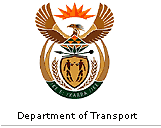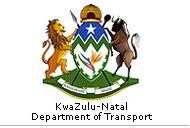 |
Durban-Empangeni-Golela (and Swaziland) Secondary Main LineThe North Coast line originally served to convey freight
traffic between Durban, Empangeni and northern Zululand.
As cane growing developed and mills were opened
along the route, both sugarcane and sugar product traffic
increased. The line was later extended to Golela, and
cross-border traffic grew rapidly once Swaziland Railway
completed a connection. This line carries through traffic
to and from South Africa and the Matsapha industrial
area, west of Manzini. A later extension through
Swaziland to Komatipoort via Mananga provided a
corridor for bulk traffic from Mpumalanga to Richards Bay.
The opening of the Richards Bay coal line in the mid-1970s
spurred further development in the Empangeni
area, and provided an alternative route for traffic
between
Gauteng, Mpumalanga and the coast.
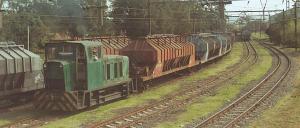
Shunting sugar tankers - Amatikulu
|
Traffic on the North Coast line consists of imports and
exports between Swaziland, Richards Bay and Durban;
transit mineral traffic between Mpumalanga and Richards
Bay; coal traffic routed over the coal line for export at
Wests in Durban, and ferro-manganese traffic from Cato
Ridge on the Natcor main line. In addition, timber traffic
on the coal line is destined for mills in Richards
Bay, Mandini and Umkomaas on the South Coast. Important
pulpwood traffic originates in the Kwambonambi area, and
is railed to Umkomaas.
A minerals processor at Richards Bay generates large
volumes of processed mineral sands in the form of rutile,
titanium and zirconium. InfrastructureThe operational standards are similar to those of Natcor.
The
entire line is rated at a 20 ton wagon axle-load, adequate
to safely handle phosphate rock trains with wagons loaded
to 80 gross tons. The section from Durban to Empangeni is
electrified, using the 3 kV direct current system.
Signalling is by way of a colour light system to Stanger,
the limit of Metro suburban passenger operations. Beyond
Stanger to Golela, a radio track warrant system
controlled from Empangeni, is employed.
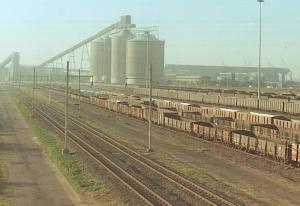
Richards Bay Marshalling Yard
|
The line is single track beyond Darnall (87 km north of
Durban). During the late 1970s, traffic on the line
exceeded 20 million gross tons between Durban and Tongaat.
This dropped to about 13 million between Tongaat and
Amatikulu, and about 12 million between Amatikulu and
Empangeni.
Traffic on the section beyond Empangeni to Golela ranged
from nearly
5 million gross tons near Empangeni to just 2 million tons
at the terminus. Most of this sugar and forestry traffic
has been lost to road transport over the years. Since the
opening of the northern Swaziland connection, traffic on
this line has increased dramatically, and is currently
about 5,5 million tons per annum. Marshalling yards are located at Stanger, Empangeni,
Nseleni and Golela. The Nseleni yard is the location of
the locomotive shed and carriage wagon repair facility,
and
the coal line trains and traffic from Golela are routed
pass this point.
Sugarcane traffic from the Nkwalini branch is routed into
Empangeni itself, passing through the old yard on its way
to the Felixton mill, 9 km to the south.
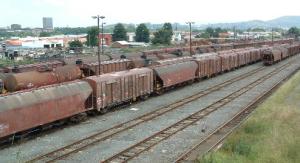
Sugar Tankers - Gingindlovu
|
For Details of
Volumes and Commodities Received
and Forwarded [Table 2]CLICK HERE
|
 |
